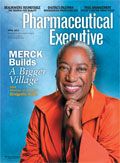The Community Clause
Pharmaceutical Executive
The conversation thread that binds this month's Pharm Exec is building communities-when the harsh economics of market change suddenly discounts the familiar, then the best way to move up is to reach out.
THE CONVERSATION THREAD THAT BINDS THIS MONTH'S PHARM EXEC is building communities—when the harsh economics of market change suddenly discounts the familiar, then the best way to move up is to reach out. Our industry is adjusting to a dramatic democratization of the customer base. The physician is today just one of many drivers in product access, while that staid intermediary, the wholesaler, is giving way to a mad dash by drug makers to connect directly to the end user, the patient: each a community of one, more unpredictable, diverse, and demanding than ever.
The most prized professional skill in Big Pharma today is the capacity to act on insights about the new customer. It's all about thinking across disciplines and drawing the uncommon inference from unexpected sources. In its 2013 "hottest jobs" survey in the life sciences, CTPartners, a board-level executive recruiting consultancy, cites positions like chief operations and integration officer and market access coordinator as of prime interest to pharma employers. More generally, there is an acute need for clinically trained MDs with business smarts, who can straddle regulatory, medical, and economic challenges and link them all to enhanced sales force effectiveness. If the industry's future lies in that fecund space beyond the pill, success means being able to foster connections, combining the science of discovery, development, and formulation with the instinctive human art of serving a living, breathing customer.

William Looney
The personal qualities embedded in this capability score sheet is captured in our cover feature on the Healthcare Businesswoman's Association (HBA) Woman of the Year, Bridgette Heller of Merck. As president of Merck's consumer care division, Heller is an expert in community-based marketing, with a mandate to expand Merck's stake in high growth, geographically diverse, and price-flexible businesses that complement the traditional focus on prescription pharmaceuticals. She comes from a large, extended family that is itself the embodiment of community: where individual identity is forged from a rich, complex web of relationships that serve as both a source of comfort—and the competition that builds character.
With the old customer map in the prescription business fraying to a disaggregated mess, Heller's background in personal care and packaged goods can define what a "total health solutions" approach really means to the new health consumer. The OTC world has always been a brutal, Darwinian struggle for market share, fought around the purchaser's freedom to choose. Yet such battle scars can provide insights applicable to prescription customers too, who are being asked to shoulder more of the cost of their own care. Suitable to a woman who made her first mark by turning the humble frozen egg roll into a marquee business, this new world of healthcare is built around menus, not mandates. And if you want to be featured on that menu, it starts with making sure you are a familiar food group—again, a part of the community.
The advantages that stem from being connected also rings loud in our second feature, Pharm Exec's Roundtable on the 2013 deal making environment. Industry experts in licensing and M&A were joined by a representative of academia, which a decade ago was not even on the industry's radar screen as a seed partner in commercializing an asset. Companies that took the long view and strove to understand the academic world's special culture and institutional biases are now poised for promising breakthroughs in commercializing new science, advances that neither party can achieve in solitude. What is exciting about industry-academic partnerships is the pace in which this mutual dependency can connect theory to process; where understandings about genetics and pure science can be structured into the DNA strands and cell proteins that are the building blocks for entirely new classes of medicines. AstraZeneca, one of our roundtable participants, is doing precisely that, right now. Power from the ivory tower is knowledge force multiplied.
Our third feature, written by editorial advisory board member Bill Drummy, founder and CEO of Heartbeat Ideas, is a useful corrective about assuming too much and knowing too little about your own target communities. Evidence about the ROI from early stage digital promotion strategies inexplicably failed to drive the allocation of marketing spend. Entrenched, insular internal decision-making cultures meant the blinders stayed on until the metrics documenting changes in the way consumers find, digest, and use information became too obvious to ignore.
Simply put, the data don't help if you don't lard it by reaching out. It's a message that works for all.

William Looney
Editor-in-Chief
Follow Bill on Twitter: @BillPharmExec

Asembia 2025: Therapy Advancements Highlight Growing Cost and Access Concerns
April 30th 2025Fran Gregory, VP, emerging therapies, Cardinal Health, discusses the evolving cell and gene therapy landscape, highlighting pipeline growth, cost challenges, and emerging therapeutic areas beyond oncology and hematology.
Addressing Disparities in Psoriasis Trials: Takeda's Strategies for Inclusivity in Clinical Research
April 14th 2025LaShell Robinson, Head of Global Feasibility and Trial Equity at Takeda, speaks about the company's strategies to engage patients in underrepresented populations in its phase III psoriasis trials.
FDA Approves Nipocalimab for the Treatment of Generalized Myasthenia Gravis
April 30th 2025Approval is based on results from the pivotal Vivacity-MG3 trial in which IMAAVY (nipocalimab-aahu) demonstrated superior disease control throughout 24 weeks when compared to placebo plus standard of care.
Beyond the Prescription: Pharma's Role in Digital Health Conversations
April 1st 2025Join us for an insightful conversation with Jennifer Harakal, Head of Regulatory Affairs at Canopy Life Sciences, as we unpack the evolving intersection of social media and healthcare decisions. Discover how pharmaceutical companies can navigate regulatory challenges while meaningfully engaging with consumers in digital spaces. Jennifer shares expert strategies for responsible marketing, working with influencers, and creating educational content that bridges the gap between patients and healthcare providers. A must-listen for pharma marketers looking to build trust and compliance in today's social media landscape.
FDA Approves AbbVie’s Rinvoq as First Oral JAK Inhibitor for Giant Cell Arteritis
April 30th 2025AbbVie secures FDA approval for Rinvoq as the first oral Janus kinase inhibitor indicated for giant cell arteritis, expanding its immunology portfolio and signaling strategic growth opportunities in underserved autoimmune markets.